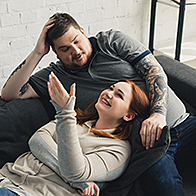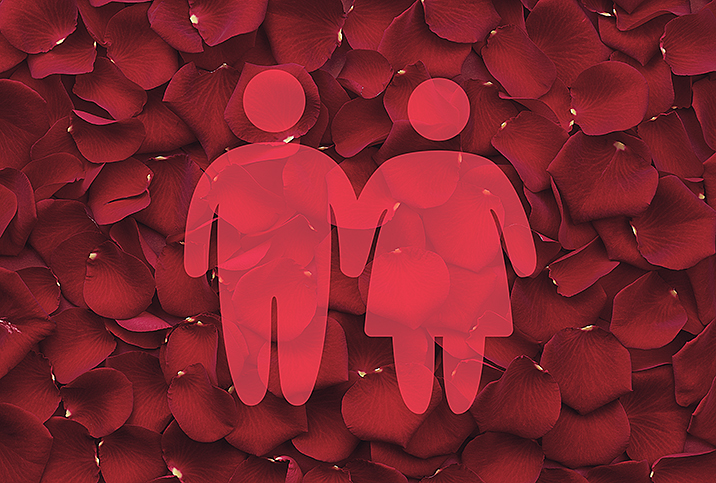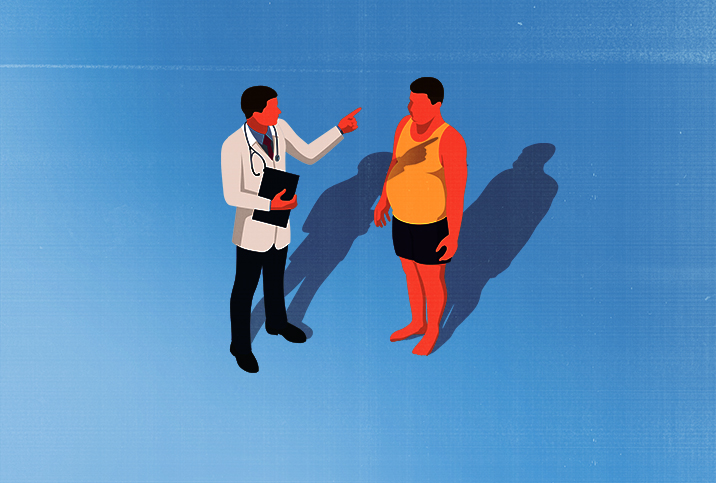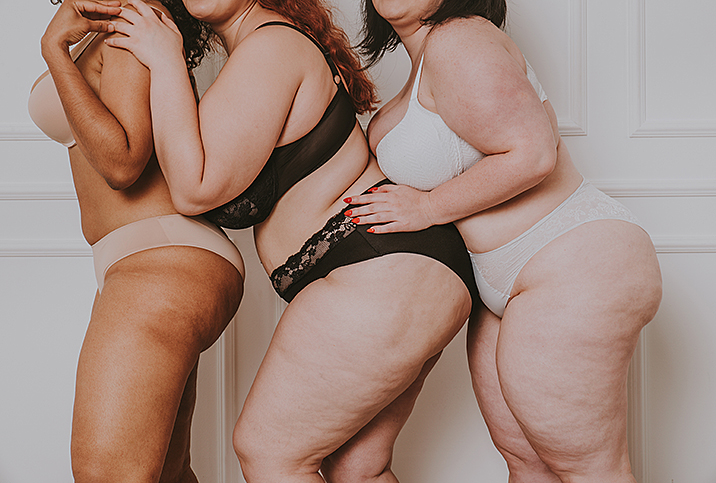The Psychology of Mixed-Weight Relationships
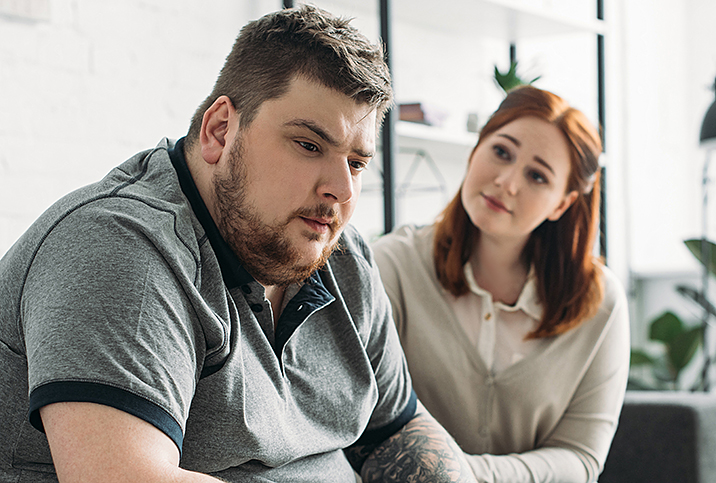
Relationships are hard, especially when you're navigating personalities, preferences and intimacy. Now factor in the opinions of family, friends and even strangers, and everything becomes even more challenging.
We know people with larger bodies often experience discrimination, harassment, inadequate health care, limited clothing options, accessibility issues and general social stigma. But the pervasive effects of fatphobia can also intrude on intimate relationships, particularly when one partner is large-bodied and the other is not.
Where mixed-weight relationships stand
Hannah Fuhlendorf, M.A., L.P.C., an educator and DiveThru therapist in Denver, is a longtime activist against fatphobia. She pointed out that mixed-size relationships have always existed.
"That is not something new; it is something that has always happened. But it has been sort of shrouded and hidden in the past, and I think that it was sort of seen as an anomaly in the past," Fuhlendorf said. "Whereas now, partly because of visibility and social media, and because the conversation around fat politics and body liberation in general is gaining more traction, people are seeing it as slightly less novel or less unusual as maybe they had in the past."
Fuhlendorf noted, however, that in many situations, mixed-size relationships and the people in them are still subject to judgment.
"Typically, the way that I see that unfolding is that, especially for the social circle of the person in the smaller body, there can be confusion or disappointment," she said. "Essentially, the people in their social world will assume that they are 'settling' or make these sort of negative connotations about what it means for the person's own self-image. It can be hard for [others] to believe that someone would genuinely fall in love with a fat person and willingly choose that because that is the relationship that they want."
Justification theory and the mixed-weight couple
Fuhlendorf's observations touch on justification theory, which involves social dominance and a sense of systemic justice.
Brian Collisson, Ph.D., an associate professor of psychology at Azusa Pacific University in California, explained justification theory in a 2016 research article published in the Journal of Social and Personal Relationships. He and his colleagues conducted four studies to assess people's prejudice and discrimination toward mixed-weight couples.
"In study 1, we found people dislike mixed-weight couples being together far more than matched-weight couples, for example, two skinny partners or two overweight partners," Collisson said, relating a finding that set the tone for subsequent tests. "In study 2, we had people act as matchmakers. We found that people pair potential romantic partners together on similar BMI [body mass index] and body size."
Study participants thought only partners of the same relative weights should date—but this mentality extended beyond the matchmaking phase and into established partnerships, as well.
"In study 3, we asked people to provide dating advice to someone who was dating someone of a similar body type [matched-weight couple] or someone of a different body type [mixed-weight couple]. People provided terrible dating advice to mixed-weight couples," Collisson noted. "They advised mixed-weight couples go to a cheap restaurant, a private place like a dark movie theater, not to display affection such as a kiss at the end of the date, and delay introductions to friends and family."
Essentially, the people in their social world will assume that they are 'settling' or make these sort of negative connotations about what it means for the person's own self-image.
Prejudice against mixed-weight couples seemed to be most prevalent among certain groups, as Collisson said he and his colleagues found in study 4.
"We found that people who score high in social dominance orientation, or those who view society as inherently inequitable and hierarchical, and system justification, or those who are motivated to maintain the current status quo, are most likely to express prejudice toward dissimilar couples in general, including interracial couples, age-gap couples and mixed-weight couples," he explained. "People who tend to view the world through the lens of social dominance and system justification likely view dissimilar couples as 'dating outside of their league' and threatening group-based hierarchies, which they tend to benefit from."
The correlation between social dominance and system justification beliefs indicates some worrisome notions about mixed-weight prejudice.
"People tend to express prejudice toward dissimilar couples in general because they tend to view such relationships as inherently unequal," Collisson said. "The extent to which people think that one partner is getting a much better or worse deal than the other partner, the more prejudice they tend to express toward the relationship."
The study was the first to demonstrate people expressing prejudice and discrimination toward mixed-weight couples. Collisson said future studies may examine whether this prejudice changes over time, though he thinks change is unlikely.
"Given the extent to which people expressed prejudice and the openness by which they discriminated during matchmaking and dating advice scenarios, I suspect that people's prejudice toward mixed-weight couples remains," he said.
What this means for you and your mixed-weight partner
Prejudice from other people comes at a cost to couples, Fuhlendorf noted, as both people in a mixed-weight relationship must expend more emotional labor to cope.
"It can be pretty challenging for the person in the smaller body, and then it can also be challenging, for different reasons, for the person in the larger body," Fuhlendorf said. "Obviously, there is a certain amount of education that's required any time there's a relationship where there is someone who has an oppressed identity and someone who does not share that with them. There is often a lot of labor on the part of the person in the larger body in terms of educating their partner about what they experience, why it's a problem, and what would actually make their life easier or better, or make them feel more supported."
These conversations typically happen most often at the beginning of a relationship but can continue to occur over time. Eventually, as a partner internalizes the lessons they're taught, such talks contribute to growth, Fuhlendorf said.
"When the person in the smaller body is in a relationship with a fat person for the first time, I think there are a lot of pitfalls that can befall that," she said. "There can be a hesitance to introduce their new partner to their friends or their family, or to be seen in public with them. It's a complicated issue, but I wouldn't be a counselor if I didn't believe people could change and grow."
Fuhlendorf is in a mixed-weight relationship with her husband of three years. He's a "straight-sized" EMT and nursing student.
"I was one of the first—and I don't know if I'm the only—but I'm one of a very small number of people in a fat body that my husband has ever dated," Fuhlendorf said. "I think he definitely had a lot to learn in terms of the hardships that I experience, especially because he works in health care. I think it was particularly eye-opening for him to see all of the medical discrimination I faced pretty early in our relationship. I needed spinal fusion surgery, and having him watch me go through that process of being denied, even when I had a broken back, was mind-blowing to him."
Fuhlendorf noted that a partner may learn some critical lessons only after making equally critical mistakes.
"We have had moments where I've had to point out that something he said hurt me. He has been really great in that he is so open to that correction and he is not going to get defensive. He's so good about stuff like that," she explained. "If you're in the dating process, finding someone who is open to your correction and open to you telling them when you see bias at play, I think that's so needed because nobody's perfect. And literally everybody has moments when their unchecked biases emerge. Being able to talk about that openly, without defensiveness, is so important."
Not just for mixed-weight relationships
Fuhlendorf further noted what her husband has learned from her has shown benefits outside their bond.
"It's been hugely successful for us because he has really, really transformed his perspective on this," she said. "It's changed the way he interacts with his co-workers. It's changed the way he interacts with his patients. It's just changed a lot and it's made him much more of a fierce advocate for people in larger bodies."
Fuhlendorf said she isn't sure her relationship is a perfect representation of what most people go through, but she offered advice for couples whose mixed-weight relationships aren't as successful.
"I would really encourage people, especially now, as this conversation has become more prevalent and more visible, to assess if that's someone that they want to be in a relationship with," Fuhlendorf said. "If you're casually dating and you perceive that someone has shame around you, you can certainly bring it up, have open communication, identify the issue. And if they're resistant to that or if they're not willing to acknowledge it or they get angry or defensive, that might not be someone who's really capable of having a healthy relationship with a fat person right now. And it doesn't mean that they won't ever be able to, but it does mean that they're not currently."







